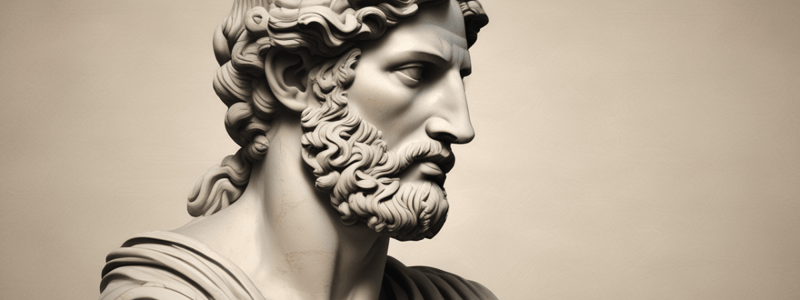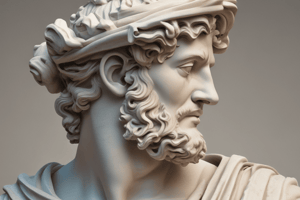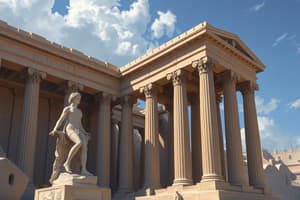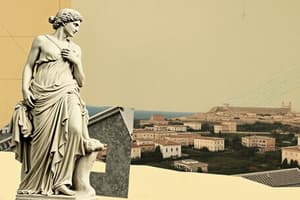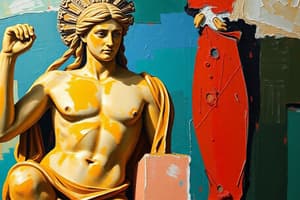Podcast
Questions and Answers
What separates Classical from Archaic Greek statuary?
What separates Classical from Archaic Greek statuary?
Weight shift (contrapposto)
Where was the bronze statue of two warriors found?
Where was the bronze statue of two warriors found?
Near Riace in the sea
What is the subject of the Early Classical bronze statue found at Cape Artemision?
What is the subject of the Early Classical bronze statue found at Cape Artemision?
Male human form in motion (Zeus)
Who was the master behind the renowned Diskobolos (Discus Thrower)?
Who was the master behind the renowned Diskobolos (Discus Thrower)?
What material were the marble copies of Myron's Discus Thrower made of?
What material were the marble copies of Myron's Discus Thrower made of?
What was the distinguishing feature of Myron's Discus Thrower in terms of expression?
What was the distinguishing feature of Myron's Discus Thrower in terms of expression?
Who was the architect of the Parthenon?
Who was the architect of the Parthenon?
Who created the statue of Athena in the Parthenon's cella?
Who created the statue of Athena in the Parthenon's cella?
What was the controlling ratio for the symmetria of the parts of the Parthenon?
What was the controlling ratio for the symmetria of the parts of the Parthenon?
Why did Vitruvius recommend that the corner columns of a building should be thicker?
Why did Vitruvius recommend that the corner columns of a building should be thicker?
What type of elements were incorporated into the design of the Parthenon?
What type of elements were incorporated into the design of the Parthenon?
What material was used to create Phidias' statue of Athena Parthenos?
What material was used to create Phidias' statue of Athena Parthenos?
What is the subject of the sculptured frieze around the altar platform?
What is the subject of the sculptured frieze around the altar platform?
Why did the Athenians include the gigantomachy on the shield of Phidia's Athena Parthenos and the east metopes of the Parthenon?
Why did the Athenians include the gigantomachy on the shield of Phidia's Athena Parthenos and the east metopes of the Parthenon?
What event did the gigantomachy of the Altar of Zeus allude to?
What event did the gigantomachy of the Altar of Zeus allude to?
Which figure closely resembles the Athena from the Parthenon's east pediment?
Which figure closely resembles the Athena from the Parthenon's east pediment?
What goddess emerges from the ground and looks on with horror in the sculptured frieze?
What goddess emerges from the ground and looks on with horror in the sculptured frieze?
How have art historians described the features of the gigantomachy as seen on the Altar of Zeus?
How have art historians described the features of the gigantomachy as seen on the Altar of Zeus?
What kind of tender human interaction between an adult and a child was absent from Greek statuary before the fourth century BCE?
What kind of tender human interaction between an adult and a child was absent from Greek statuary before the fourth century BCE?
Who was the sculptor known for introducing intense emotionalism in his work, although none of his statues survive?
Who was the sculptor known for introducing intense emotionalism in his work, although none of his statues survive?
What new canon of proportions did Lysippos introduce in his sculptures?
What new canon of proportions did Lysippos introduce in his sculptures?
What famous work by Lysippos depicts an athlete scraping oil from his body after exercising?
What famous work by Lysippos depicts an athlete scraping oil from his body after exercising?
How did Lysippos encourage observers to view his sculptures?
How did Lysippos encourage observers to view his sculptures?
What must the viewer do to fully understand Lysippos' colossal statue depicting a Weary Herakles?
What must the viewer do to fully understand Lysippos' colossal statue depicting a Weary Herakles?
Who is credited with bringing an end to the serene idealism of the previous century in Greek thought and art?
Who is credited with bringing an end to the serene idealism of the previous century in Greek thought and art?
What distinctive individual styles emerged in the Late Classical period of Greek sculptors?
What distinctive individual styles emerged in the Late Classical period of Greek sculptors?
Which Greek sculptor is known for introducing a new approach to art with a focus on worldly sensuousness?
Which Greek sculptor is known for introducing a new approach to art with a focus on worldly sensuousness?
What made the statue of Aphrodite created by Praxiteles in Knidos so famous?
What made the statue of Aphrodite created by Praxiteles in Knidos so famous?
Describe the statue of Hermes and the infant Dionysus created by Praxiteles.
Describe the statue of Hermes and the infant Dionysus created by Praxiteles.
Where is the original statue of Aphrodite by Praxiteles located?
Where is the original statue of Aphrodite by Praxiteles located?
Flashcards are hidden until you start studying
Study Notes
Early Classical Period
- The weight shift in statues, known as contrapposto, separates Classical from Archaic Greek statuary.
- The Riace warriors, found in the sea near Riace, showcase a more pronounced weight shift and a more forceful turn of the head.
- The male human form in motion is the subject of another Early Classical bronze statue, similar to the Artemision Zeus.
Myron's Diskobolos
- Myron's Discus Thrower is a vigorous action statue that freezes the action and arranges the body and limbs to form two intersecting arcs.
- The athlete's face remains expressionless, concentrating on the task at hand.
- The statue does not perform for the spectator, unlike other Classical statues.
Parthenon: Architecture and Sculpture
- The Parthenon's peripteral colonnade is still standing, designed by Iktinos and Kallikrates.
- The statue of Athena in the cella was the work of Phidias, who was also the overseer of the temple's sculptural decoration.
- The Parthenon is the ideal solution to the Greek architect's quest for perfect proportions in Doric temple design.
- The controlling ratio for the symmetria of the parts can be expressed algebraically as x=2y+1.
- The stylobate curves upward at the center on the sides and both facades, carrying up into the entablature.
Late Classical Period
- Greek thought and art began to focus on the individual and the real world of appearances instead of on the community and ideal world of perfect beings and perfect shrines.
- The new approach to art is evident in the work of Praxiteles, who humanized the deities, making them more worldly and sensuous.
- Praxiteles' Aphrodite of Knidos, a nude goddess, was unprecedented and made Knidos famous.
- The Praxitelean "touch" is also evident in the statue of Hermes and the infant Dionysus, showcasing tender human interaction.
- Skopas was another sculptor and architect who designed a temple and contributed to the decoration of the Mausoleum at Halikarnassos, showcasing intense emotionalism.
- Lysippos introduced a new canon of proportions, making the bodies more slender, and encouraged the observer to view his statues from multiple angles.
Hellenistic Period
- Hellenistic sculptors expanded the range of subjects considered suitable for large-scale public sculpture.
- The Altar of Zeus at Pergamon, built in the third century BCE, features a sculptured frieze populated by about a hundred larger-than-life-size figures.
- The gigantomachy, depicting the battle of Zeus and the gods against the giants, alludes to the Attalid victory over the Gauls in Asia Minor.
- The monument's west front has been reconstructed in Berlin, showcasing a tumultuous narrative with emotional intensity, vivid depictions of death and suffering, and deep carving that creates dark shadows, earning the description of "baroque" from art historians.
Studying That Suits You
Use AI to generate personalized quizzes and flashcards to suit your learning preferences.
